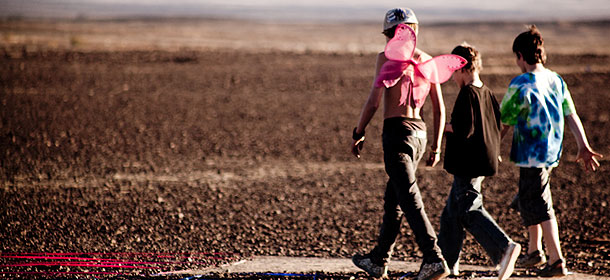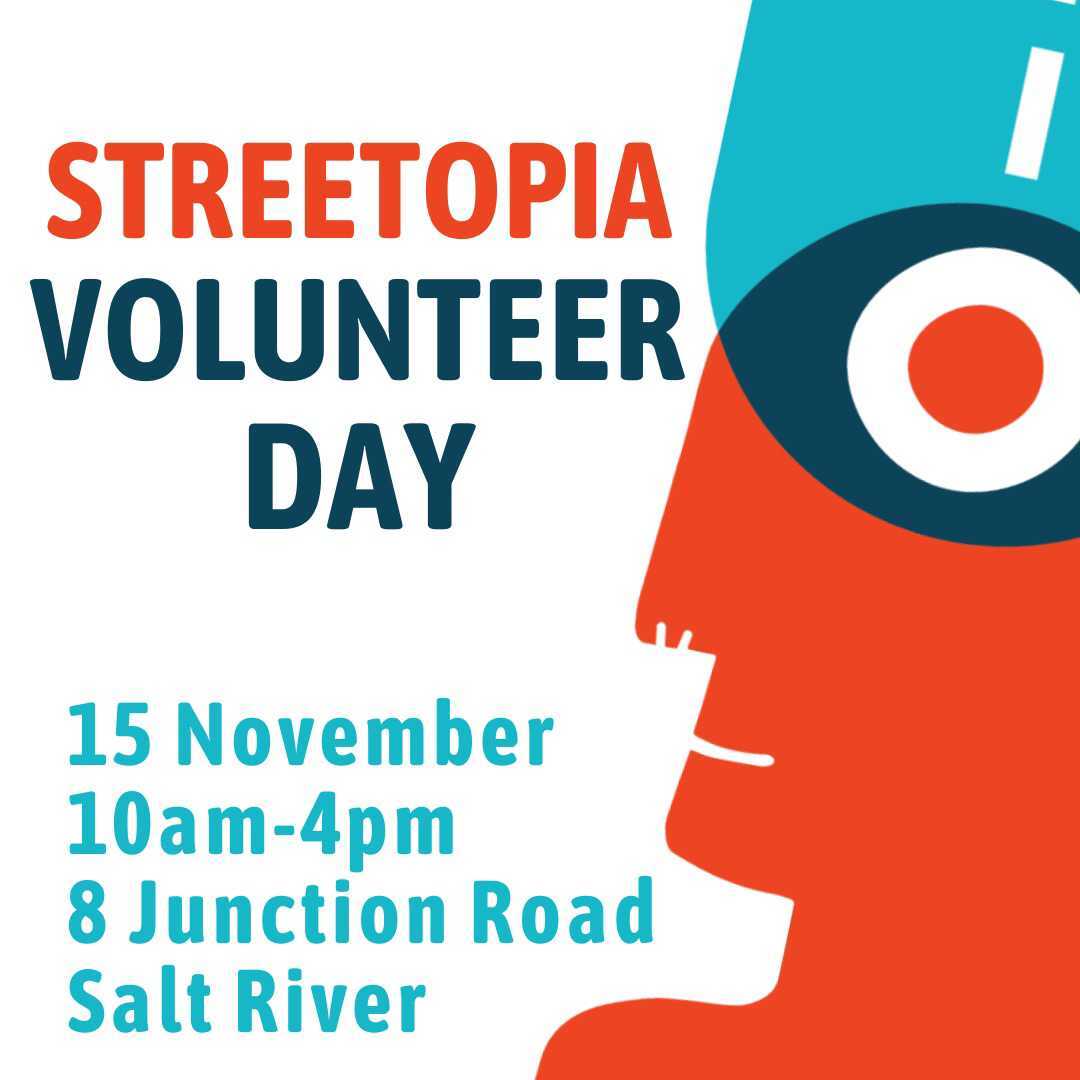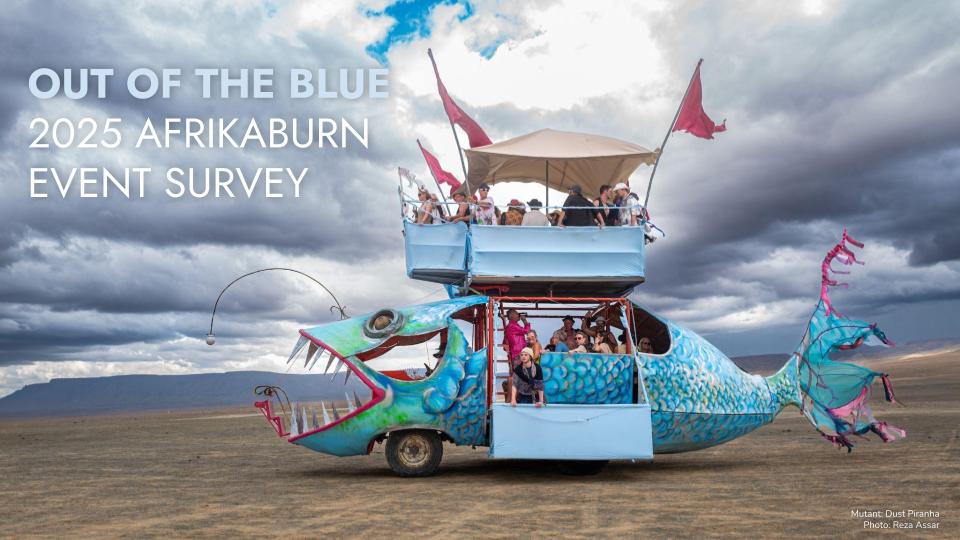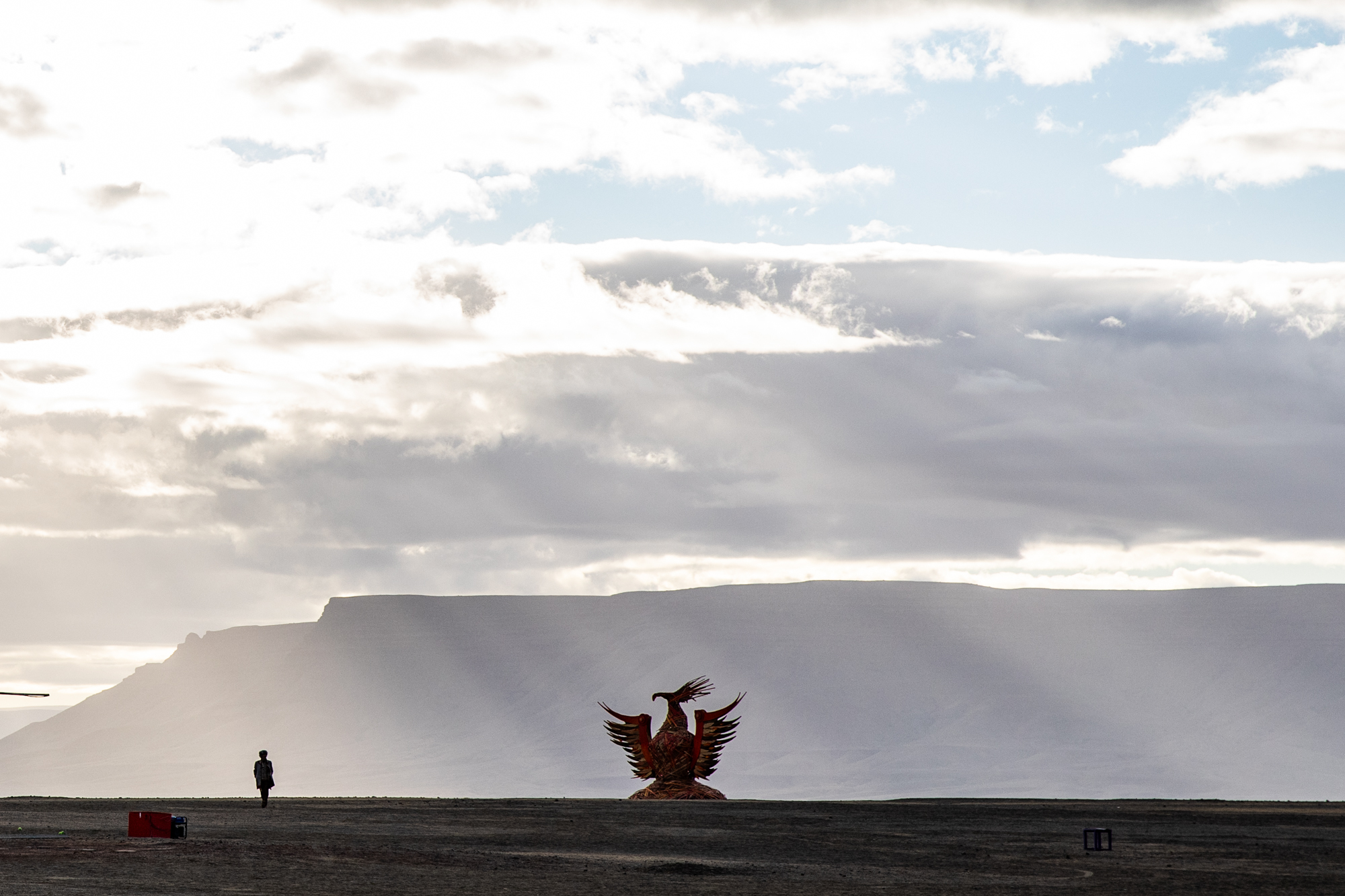It takes a village to raise your child (and gives you a chance to party)
Attending AfrikaBurn with your children can be wonderful but demanding. A dear friend who came with her young son found the experience very rewarding but limiting in terms of being able to do other adult-focussed activities. Children rise early, engage the whole day and are asleep just as the big burns and theme camps are getting ready to launch. Be realistic with yourself and your children; it is not likely that you will be able to explore with them in the day and party all night, only to find a happy face through the fog of a hangover the following morning.
Ideally one should partner with other parents with children, camp with others, and call on the assistance of child-focussed and mindful adults. I emphasise child-focussed and mindful adults. The best supportive system is a clear and shared system of ‘parents on shift’. You and your child need to feel safe and trusting that there is always a clearly identified adult person on shift. This is essential in the early morning when children may wake up in a camp of late sleeping adults. It is also advisable to have an adult on duty at the campsite to help any child that wakes up in the middle of the night in an empty tent with no parents to soothe them back to sleep.
Planning and attending the event as a cooperative group of adults and children will share the burdens, ensure good care, and add to the enjoyment of all. I often find that adults who are not parents themselves and are helping the children of their friends find AfrikaBurn a more rewarding experience through their interaction and care of the children. To experience the event with children prompts us to move beyond our own limiting adult hedonistic lens, reminds us and triggers memories and experiences of our own childhood which often links to archetypal processes of wonder, discovery, and new experience.
Ultimately the shared care and mindful attention to children at the event transforms AfrikaBurn from an individualistic party into a revolutionary expansive and experiential community.
Midget packs and child-friendly camps
One of my great enjoyments whilst rangering is encountering the many groups of children who have banded into bike gangs or flocks of wandering little ones. I encourage you to encourage your children to connect and explore with other children. AfrikaBurn is a great place to ride a bike, it is also a great place to make new friends. I feel that our day-to-day reality often segregates and excludes us from our neighbours and others. AfrikaBurn is an opportunity for your child to experience and encounter the other in a hopefully safe and enabling environment.
You can help this by possibly creating a space in your own camp where your children can invite and ‘host’ other children. When you arrive seek out the area’s with other parents, once you have set up your camp, walk the area around your camp with your children and consider introducing yourself to other parents and children. This assumes that you have already contracted with your children around the issue of traveling around the site, what to do when meeting strangers, where they should and should not go.
Walking the site with your child really helps to enforce this. Together you and your child are able to familiarise yourselves with the site, it gives you an opportunity to set boundaries and make recommendations of what your feel your child should and should not do on the site. By making your child comfortable within their own camp, comfortable within their immediate area or neighbourhood, comfortable and empowered where to go and where to seek help you lay down the good practice that will minimise problems and speed up resolution of any problems they encounter. Don’t forget to please tell your children about the rangers, maybe come and find one, so that they know rangers can help if needed.
AfrikaBurn has many theme camps which, together with the art, provide most of the event’s pageantry and entertainment. Theme camps should be registered with the event and listed in the event programme. A number of the theme camps are child friendly and have child-focused events. I would encourage you to go with your children to the various camps before you allow them to wander off and explore them themselves. The child-friendly theme camps are a valuable part of AfrikaBurn and need to be cherished and supported. Please do not see them as replacement parents and hand over all responsibility on them to look after your children.
Hopefully those new to AfrikaBurn after reading this and experiencing the event will be inspired to create a child-friendly theme camp of their own.
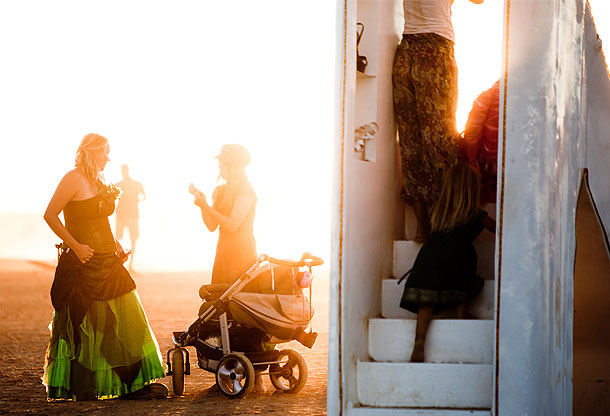
Art Cars and other vehicles on site
Once participants have arrived, located their camp, and set up they are not allowed to drive around on site. The only vehicles on site are event organiser vehicles and art cars. Some art cars are large people movers that trundle around the site. Whilst they should drive slowly and carefully you need to be very careful about how your children interact with them. Small children running to or behind the vehicles, trying to get on or off whilst moving, or climbing about can pose a big safety risk. Art Cars may look pretty, but they can still hurt!
AfrikaBurn has a lot of bikes on site. As mentioned it’s a great place for children to ride around. Please however do bring tire repair kits and clearly decorate / mark your child’s bike. It is vital that all parents teach their children good bike-riding etiquette – children often abandon bikes in the roads, or just outside tents, sculptures and entrances, which can all lead to accidents and broken bikes. AfrikaBurn does not allow quad bikes, motorbikes, or even motorised bicycles which can all be lethal to a small child crossing a dark road at dusk.
Consider your children’s visibility at all times! I recommend that you get reflective clothing, give your children whistles to blow, and always ensure they have a light source on them. Ranger Bob likes children with a head torch, a back-up torch, and spare batteries. Consider attaching a torch via strong cord to your child’s backpack or clothing so that they do not get lost.
Mummy, why is that man naked?
One of the things to prepare yourself for is how to process what your child may encounter on site in AfrikaBurn. It could be a naked man on a unicycle, an elderly man naked, a group of young women with body paint, or even a whole parade of topless women marching for breast cancer awareness. Chances are that your children will encounter intoxicated participants, be exposed to challenging artwork, and encounter rude language, revolutionary rhetoric, or even political and religious themed work and discourse. Your teens may encounter sexualised instances either in the form of explicit content, or sexually provocative behaviour.
One of the aspects of AfrikaBurn is radical self expression. This in turn, like all conflicting and competing human rights, needs to be balanced with civic responsibility and radical inclusion. AfrikaBurn does not seek to control what participants think and believe in beyond adhering to the ten principles. At the same time we need to balance censorship and content control with allowing as much as possible the diverse, radical, and self expressive expression of our participants. The rangers and organisers believe in an informed participant able to make their own choices. We also however believe that children should be protected from pornographic and explicit sexual and violent experiences.
The key is that we all have our own family values, belief, and boundaries. Effective and open communication with your children will help them process all that they encounter and experience at the event. Encourage them to feel able to come to you and talk about that strange naked man on the unicycle. Please feel free to come and speak to myself or any of the senior rangers if you are troubled by what you and your children encounter at the event.
Seeing things from their perspective (locating yourself on the map)
I have mentioned this before but I encourage you to see the site through your children’s eyes. Their experience and scale often means they see the site differently than you. Seeing things from their perspective helps them navigate the site, and help you find them should they get lost. It helps to as much as possible locate yourselves and important sites on the event map that you will be given when you arrive. I would encourage you to have an end of the day feedback session every day. Ask your child what they did and where they went, get them to mark it on the camp map.
Getting your child to note where they go and spend time can be valuable should they go missing. The first action in locating a missing child is to check in their usual places.
If your child is independent, make sure they have a survival pack
Heck even if they are not a far traveller it is a great idea to empower your child to take ownership of their very own survival pack. Before the event decide on a sensible and manageable day pack. This pack should have the following:
- A name tag with their name, and physical campsite location
- Warm clothing
- Sunblock
- Lip ice
- A spare hat
- Water
- Snacks
- A torch and a backup torch
- A towel or cloth for swimming / shade / sitting on
- A whistle
- A place to put found things like rocks, beads, gifts ect
- A note pad and some writing / drawing material
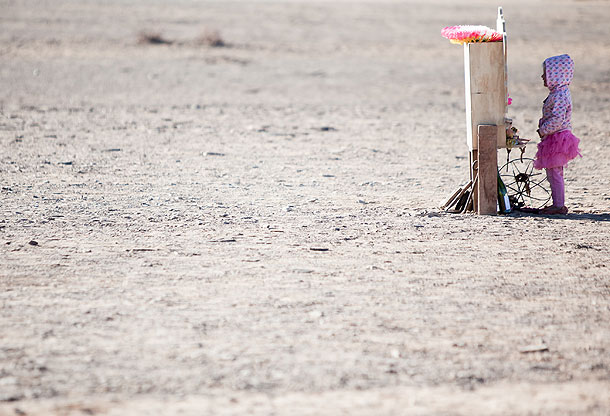
Preventing them from getting lost
One of the scariest experiences for parents, and a common reported problem for rangers are lost children. Preventing them from getting lost starts with good communication and being aware of what and where your children are. A number of the sections above help children from getting lost. Having a parent or adult on duty, knowledge of your child’s usual locations and activities, and encouraging your children to regularly check in all minimise the risk of your child getting lost.
Children should be encouraged to play with other children and not go wandering away far from other people and the camping area. Children should be familiarised with the site and where the medics / rangers / and main site office is located. Small children should be encouraged to seek out a ranger if they are lost. Discuss with your child about getting lost – ask them what they would do if they found themselves lost and give them advice. I find it is best to get a lost child to locate the nearest child friendly camp or theme camp and once there ask one of the adults to send for a ranger. A lost wandering child can hamper being found if they move from place to place.
Mostly it’s vital to get your child to internalise two key things:
- I need to check in, maybe around every meal time. It is difficult to keep a track of time in Tankwa Town, so I would encourage you and your children to rather think of time in terms of physical factors such as sunrise, midday, sunset or to time things according to their hunger. Often children wander off and lose track of time.
- If I get lost I must try to be brave and not panic. Children who can calmly find a responsible adult to help will soon be reunited with their family.
It is a fine balance between giving your children the space and freedom at the event and keeping your children safe and secure. As long as your child wants to be found all will be fine; we have had the occasional grumpy teen who is happy to stay lost. Every year children go missing and every time they get found, sometimes completely oblivious that they were lost or rather that their parents had lost them.
What to do when they are lost
Don’t panic!
Check their usual hang outs.
Ask the other children; I often find that children are aware of other children and can help locate missing children.
Ensure that someone is able to stay at your camp whilst you go out to look.
Find and report the missing child to the rangers. Rangers will want to know what the child looks like, what are they wearing, and where your camp is located. This links to you locating yourselves on the map of the event and locating yourselves to a number of physical markers: “we are camped at three ish back by the bushes next to the theme camp with the windmill”
Journal it and share the experience
Lastly I encourage all parents and children to write in a journal at the end of each day at AfrikaBurn. Take some time connecting and recording what you saw and experienced. Journaling can be a great way of processing the day, as it helps contextualise the experience. Children are on a fast-tracked and changing process of growing up. The journal of AfrikaBurn can become a snapshot of not only your event but allows them to reflect and measure their and your development and growth over the years.
Hopefully it also becomes a potential source of tips and advice for other parents and children. Please consider getting your child to write to me and share their experience of AfrikaBurn. Please feel free to contact me for anything child-related or any matters related to health and safety at: jono (at) afrikaburn (.) com
Many thanks for reading and see you in Tankwa Town!
Photo credits: Jonx Pillemer

